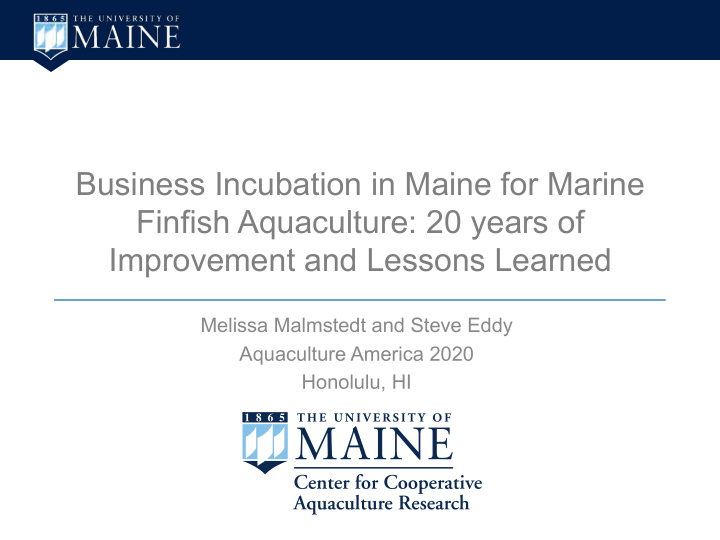



Business Incubation in Maine for Marine Finfish Aquaculture: 20 years of Improvement and Lessons Learned Melissa Malmstedt and Steve Eddy Aquaculture America 2020 Honolulu, HI
CCAR History • Penobscot Salmon, 1989 – 24 acre site • Maine Economic Improvement Fund, 1997 – Targeted seven economic sectors in Maine • Research à Industry
The CCAR Site EDA MABI TBMH MATL
CCAR’s Mission To grow the aquaculture sector in Maine through … • Innovation Develop and improve farming technologies for aquatic species • Demonstration Pilot trials and demonstration projects • Facilitation Facilities for industry and researchers to carry out projects and trials • Collaboration Work with others towards sustainable aquaculture and fisheries • Education Train staff and students and educate the public about aquaculture
Species at CCAR Past Present • Atlantic cod, 2003-2018 • Atlantic halibut, 2000 – Demonstration, cataracts, and • Yellowtail kingfish, 2012 breeding • Lumpfish, 2018 • Black sea bass, 2012-2017 • American eels, 2018 – Growth, feeding, and marketing • Marine polychaete worms trials (AHI) – Bait, IMTA, bioremediation, alternative feed • Green sea urchins • Marine ornamentals • Macro and micro algae
Funding • Maine Economic Improvement Fund – Supports CCAR to this day through annual state appropriations to UMS • Sponsored research projects – Maine Sea Grant, National Sea Grant, NRAC, SBIR, and NSF • Infrastructure funding – Economic Development Administration • EDA Taunton Bay Marine Hatchery – Maine Technology Asset Fund (bond-funded) • MATL – 2.6M, 2008 • MABI
Cost Recovery • Fees paid to CCAR for incubation space • Hatchery services – Egg and juvenile sales • Training courses
Business Incubation • Current Industry Partners – Sea and Reef Aquaculture, 2012 – American Unagi, 2018 – Kingfish Maine, 2020 – Springtide Seaweed, 2017 • Past Industry Partners – Maine Halibut, 2003-2010 – Acadia Harvest, 2012-2017 – Great Bay Aquaculture, 2005-2010
Workforce Development • Introduction to Aquaculture • Marine Hatchery Technician Training • Internships • Summer Programs • SMS 449: Aquaculture Systems – Pilot 12 credit certificate • RAS • Shellfish and Finfish Husbandry • Aquatic Animal Health • Shellfish Farming • Industry Internship
Why Maine? • Maine has a strong aquaculture business development and incubation infrastructure
Why do some fail to commercialize? Conditions for Success Causes of Commercialization Failure • Lack of capital • Startup capital – Greater economic environment – For CCAR operations and off (lack of private investment) site expansion • Public funding in Maine • Public funding in Maine – Double-edged sword • Detailed business plan • Solid understanding of aquaculture and business
Thank you! Steve Eddy Melissa Malmstedt steve.eddy@maine.edu melissa.malmstedt@maine.edu
Recommend
More recommend